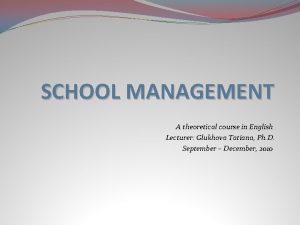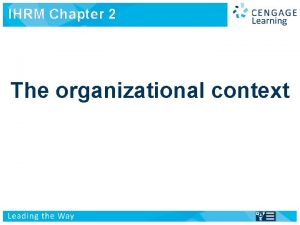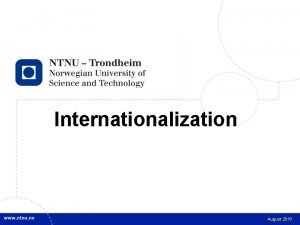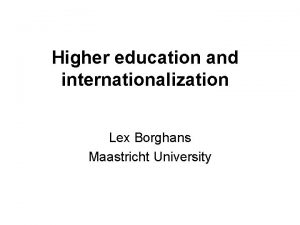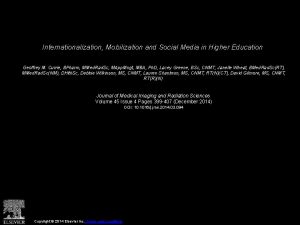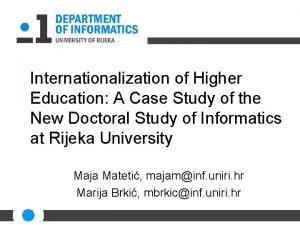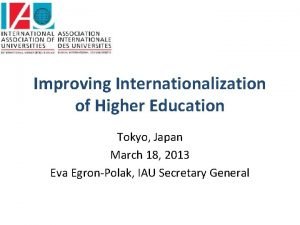COVID 19 AND INTERNATIONALIZATION OF HIGHER EDUCATION IN












- Slides: 12

COVID 19 AND INTERNATIONALIZATION OF HIGHER EDUCATION IN AFRICA ANIE WEBINAR 2 nd JULY 2020 PROF E. ABENGA Masinde Muliro University of Science and Technology

OUTLINE • INTRODUCTION: • The character of Internationalisation in Africa • The impact • The changes after COVID-19 • Outcomes of the current situation • Moving forward with the internationalisation agenda in Africa

Introduction • “Internationalization of higher education is the process of integrating an international and intercultural dimension into the teaching, research and service functions of the institution. ”(de Wit 1999) It is a process, and includes both international and local elements. initially the purpose was to strengthen and consolidate Africa’s potential in teaching, research, scholarship and innovation. Other rationales : Political- economic – academic- cultural- institutional

The Character of Internationalisation in Africa • International students mobility out of the continent has been higher than into the continent. • Exchange programmes have not been equally reciprocal. • Non-return of African academics and experts to the rest of the world caused brain drain and loss of innovations to other continents (Knight 2013, ) • There has been more technical expertise in-bound to Africa than the reverse. • Research issues in Africa are set by external collaborating partners & significant intellectual benefits are thus secured outside Africa (Alemu 2014)

Africa approaches internationalization in a way that reflects its history, culture and context and in a way consistent with its current needs, priorities and circumstances • Mobility: greatest to Australia, Europe, China, USA & Canada • bilateral partnerships in research, scholarship and innovation • policy/model imports, (benchmarking) • • • invitations to Western technical advisers to Africa Student and faculty/staff exchanges Infrastructural development Human resource development Community service linked to financial support

Impacts of Internationalisation in Africa • Improved quality of teaching, learning and research. • Deep stakeholders engagement in national, regional and global issues. • Provision of opportunity to students to access programmes that are unavailable nationally. • Increased opportunities for faculty improvement and decreasing the risk of academic ‘inbreeding’. • Provision of platforms for globally networked research. • Provision of opportunities for institutions to learn from international good practices. • Improving institutional policy-making, governance, student services, outreach, quality, etc. through collaborative experience sharing

COVID 19 ! What has changed? • Travel bans • Interruption of events. • Closures of institutions • Working away from the station • E-learning • Concern about Insecurity of international staff and students • Unprepared international student support

Negative outcomes • Reduced/ no mobility (World Bank (2002) estimated that some 70, 000 highly qualified African professionals, experts, scholars and managers with internationally marketable skills leave Africa every year. This is about to change. ) • Virtual and online conduct of business: capacity to use technology varies due to inequalities and disparities (regional, national, institutional and individual) • International programmes effected: recruitment, completion, intercultural progrmams • Funding for Internationalisation may be affected due to shifting financial priorities • Student support division’s capacity to handle the unique situation is challenged: management of discriminatory behaviour, cancellations of events, etc. • African HEIs find themselves with limited intra-continental internationalisation activities in Africa and, • Little embraced internationalisation-at- home strategies

Some Positive outcomes • Regaining lost capacities though diaspora returnees • More interest to be in Africa. A motivation to improve institutional systems efficiency and enhance intra -Africa mobility and collaborations • Heightened use of technology and increased provision of the requisite infrastructure which is pivotal for moving forward in higher education enterprise. • Enhanced awareness of the need for health and safety and increased frameworks and guidelines to assure these.

Positive outcomes of COVID 19 situation on HE internationalization Provides an opportunity to consider and work towards : • Turn Africa into the new destination for International students • Enhancing Inter-African mobility programmes and cooperation within HE • Enhancing Internationalisation at home through relevant policy frameworks, strategies and programmes • Internationalising the HE curriculum to attract and enlist international students globally (re-tooling learning objectives & redesigning existing courses) • Internationally accredited courses • Leveraging on technology in provision of an international curriculum, research and cultural experience and maintain connectedness during separation • Improve student support in tandem with challenges faced by international students and staff during such situations • Improving African HEIs health and safety protocols

Going forward: • Need for committed Leadership for institutional culture to support reengineering of internationalisation • Leveraging on technology to conduct HEIs business, teaching, research , administration, etc. : enhance connectivity, make technology use accessible and affordable, build capacity for its use. • Retain African diaspora returnees and attract more to bring back the internationalisation benefits home • Dual purposing approach to funding internationalization • Integrating ITN to institutional strategic planning, quality assessment, performance contract assessment • An African Higher Education Internationalisation agenda and block • African Mobility programs: Developing an Africa program funded by the African Union Commission to encourage mobility (long-term and short-term) of students and staff; to attract the best talents and to promote African higher education worldwide.

Thank you
 Internationalization of higher education in the philippines
Internationalization of higher education in the philippines Globalization vs internationalization
Globalization vs internationalization Kerry zhu
Kerry zhu Management demands of international growth
Management demands of international growth Internationalization framework
Internationalization framework Department of higher education and training
Department of higher education and training Havering college of further and higher education
Havering college of further and higher education Efficiency and effectiveness in higher education
Efficiency and effectiveness in higher education Demographics and the demand for higher education
Demographics and the demand for higher education Orticaria dermografica e vaccino covid
Orticaria dermografica e vaccino covid Enregistrement e16 covid
Enregistrement e16 covid Covid
Covid Community action thurston county
Community action thurston county

